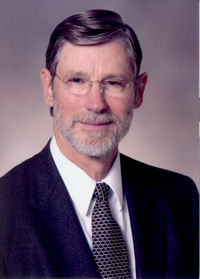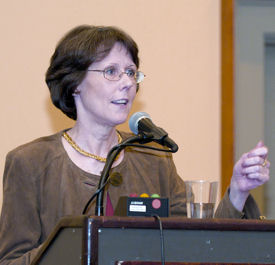Hunting for causes, cures and small game
D. Lynn Loriaux, MACP, talks about how he transitioned from forestry to husbandry to internal medicine, hiw skills at the trumpet, and searching for cures to endocrine diseases at the Institutes of Health.
D. Lynn Loriaux, MACP
Age: 68

Current position: Chairman, department of medicine at Oregon Health and Science University.
Current residence: West Linn, Ore.
Hometown: Santa Fe, N.M.
Family: Wife and five children.
Medical school: MD/PhD, Baylor University
Residency: Brigham and Women's Hospital, Boston
Fellowship: Endocrinology at the National Institutes of Health.
Something I wish I'd learned in medical school: Accrual accounting.
I became an internist because: I started in forestry and then I went into animal husbandry. Then I went into veterinary medicine. Then I got an opportunity to do research in a laboratory. My mentor there said if you really like this, you'll have to go to medical school because nobody else will pay for this.
First job: My first job was leading stained glass windows. My father was an artist so I went there after school. I hated that job beyond belief. My first professional job was at the National Institutes of Health as a clinical associate. I stayed there for 20 years.
Most rewarding aspect of my job: Teaching students and house staff. I do all the other bad stuff so I get to do that.
Most meaningful professional accomplishment: At the National Institutes of Health, we developed an understanding of the pathophysiology of several endocrine diseases and worked out the treatment for a few.
Future goals: To get past whatever's happening to the economy. It's deadly bad out here. And I'm probably getting toward the end of my time as chairman and I don't know what I'll do next, but I'll probably stay and devote all my time to teaching.
Hardest medical lesson learned: That the patient is not the only sufferer. There's a constellation of sufferers and you have to pay attention to all of them.
Personal heroes: People who are heroic to me are people who are able somehow against all odds to make beneficent change. So, Akhenaten, an Egyptian pharaoh who changed the whole religion by himself; Peter Abelard, a 13th Century scholar who was willing to be burned at the stake for humanism; and two heroes born on the same day: Charles Darwin and Abraham Lincoln. Then, of course, as for all U.S. physicians, William Osler.
Pet peeves: People talking when I'm trying to watch the Lehrer news hour.
Favorite ways to spend free time: Catch fish and hunt birds.
Favorite author or poet: Yeats is my favorite poet and Cormac McCarthy is probably my favorite author right now.
Most meaningful non-medical accomplishment: I was a good trumpet player. I was at the top of the heap when I was in high school.
Item I can't live without: Moby Dick.
Most surprising thing about me: My wife says I spend all day during the week trying to save people's lives and I spend both weekend days trying to take the lives of poor creatures.
Biggest regret: Honestly, I'm almost regret-free.
If I weren't a physician, I would be: A veterinarian.




